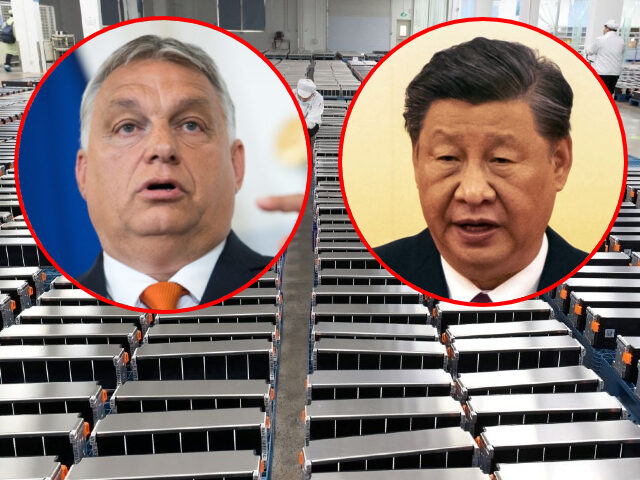Hungarian Prime Minister Viktor Orbán said this week he supports the Chinese Communist Party’s “political settlement” proposal for the Russian invasion of Ukraine, a document urging “dialogue and negotiation” with little detail.
Orbán, whose nation borders Ukraine, has not embraced the Ukrainian war cause as enthusiastically as other European Union nations, urging caution regarding lavish spending on supporting Kyiv. Orbán threatened to block a $19 billion aid package in December, warning that unchecked expenses could turn the European Union into “a community of indebted states instead of a community of cooperating member states.”
The Orbán administration has, however, embraced the cause of aiding Ukrainian refugees fleeing the war.
“All refugees who come from a neighbouring country must be helped,” Orbán declared in the early days of the Russian “special operation” to oust Ukrainian President Volodymyr Zelensky last year.
Regarding China, the Hungarian government, despite presenting itself as anti-communist, has embraced ties with Beijing, joining China’s “Belt and Road Initiative” (BRI) debt trap plan and greenlighting Chinese investment in the country. Budapest has also allowed the operation of “Confucius Institutes,” Chinese Communist Party indoctrination centers, on Hungarian land and explored a controversial plan to allow Shanghai’s Fudan University to open a campus in its capital, which is currently reportedly on hold.
Hungary welcomed top Chinese Politburo member Wang Yi, the former prime minister, last week. Wang was among the first to celebrate Orbán’s landslide victory in national elections last year, vowing that China would “continue to enhance bilateral cooperation in various fields to build a stronger comprehensive strategic partnership.”
“The election result shows that the independent policy pursued by the Hungarian side is in line with the country’s national conditions and the common interests of its people, and is firmly and broadly supported by the people,” Chinese media quoted Wang as saying at the time.
Russia initially invaded Ukraine in 2014, colonizing its Crimean peninsula and fueling a nine-year-old guerrilla war in the eastern Donbass region. In February 2022, Vladimir Putin announced a “special operation” to launch a full-scale invasion of the country and overthrow Zelensky, who he branded a “Nazi” illegitimate president. Zelensky became president of Ukraine after winning a free and fair election in 2019.
“We need a cease-fire and the start of peace talks,” Orbán demanded during a parliament session on Monday, according to the state outlet China Daily.
“I see that most states support peace, and Hungary cannot isolate itself from most of the world,” Orbán continued. “We consider China’s peace plan important, and we support it.”
On February 24, the anniversary of the Russian “special operation,” China published what it described as a 12-point exit strategy to end the war. The strategy did not mention Russia withdrawing troops from occupied areas – in addition to Crimea, Putin has “annexed” the entire Donbass region, Kherson, and Zaporizhzhia – or identify Russia as the aggressor for launching the “special operation.” It did emphasize China’s opposition to the use of economic sanctions against Russia.
“Dialogue and negotiation are the only viable solution to the Ukraine crisis. All efforts conducive to the peaceful settlement of the crisis must be encouraged and supported,” the Chinese “Political Settlement of the Ukraine Crisis” document read. “All parties must stay rational and exercise restraint, avoid fanning the flames and aggravating tensions, and prevent the crisis from deteriorating further or even spiraling out of control.”
The document also requested that Russia and Ukraine not use nuclear weapons or attack nuclear power plants.
Expanding on the details of the plan, the state-run Global Times newspaper explained that China wants Ukraine and Russia to “calm down as soon as possible” but did not offer any clarity as to how to calm the belligerents.
The Kremlin responded to China’s plan with “great attention,” but little action.
“Any attempt to produce a plan that would put the conflict on a peace track deserves attention. We consider the plan of our Chinese friends with great attention,” top Putin spokesman Dmitry Peskov said on Monday. “As for the details, they should be a subject matter of through [sic] analysis, with the interests of very different parties taken into account. This is a very strenuous process.”
Ukraine responded cooly to the plan.
“President Volodymyr Zelensky said he did not like all the points of China’s peace plan, adding that ‘we can work’ with some of them,” the state outlet Ukrinform reported on Monday.
Zelensky has repeatedly requested talks with Chinese dictator Xi Jinping, however, to no avail. Last week, the Ukrainian president claimed that he was in the planning stages of such a meeting to address “not only the war,” but Ukraine’s close trade relationship with the Chinese Communist Party.
Ukraine, like Hungary, is a BRI partner. Zelensky has expressed hope in the past that, through the BRI, Chinese companies will help rebuild the parts of his country devastated by Russian bombardment. In January, First Lady Olena Zelenska, attending the World Economic Forum in Davos, Switzerland, handed a letter from her husband to Xi to the Chinese regime delegation there. No public information has surfaced regarding any response from Beijing.
The European Union (EU), heavily involved in the war through support for Ukraine, dismissed the Chinese “plan” entirely as unspecific and lacking novelty.
“China introduced its ‘position paper’ on a political settlement. It is not really a peace plan and mostly reiterates well-known Chinese positions,” the top EU foreign policy official Josep Borrell said on Sunday, “some of which we share while important ones are missing.”

COMMENTS
Please let us know if you're having issues with commenting.